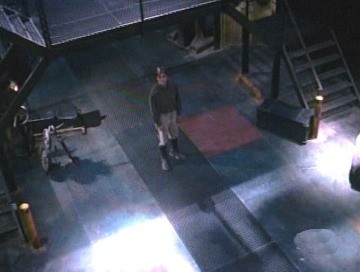Looking for serenity in unlikely places
And they say you can maybe find forgiveness after
Maybe find a place to stand alone...
(-Horslips)

If y'all will forgive me another Firefly themed post, I promise to make this more meaningful than some of my previous bordering-on-fanboy enthusiasm.
Last night, I was watching the episode Out Of Gas. If you want a full plot summary, you can go here. Basically, what happens is: the ship is dead in space after part of the engine explodes. Because the engine isn't turning, the life support has shut down, so there's not enough oxygen to keep nine people alive for more than about three hours. Mal orders the rest of the crew off in the two shuttles to search for help. He stays with the ship in case anyone gets the distress beacon that was fired off.
There is a subtly powerful sequence as the crew leaves the ship. Inara begs Mal to leave with her, telling him he doesn't have to die alone; Mal responds "Everyone dies alone." Jayne informs Mal that he made a spacesuit ready for him--the assumption being that Mal is going to run out of air and could use whatever oxygen is left in the suit's tanks. However, Mal interrupts him with "I won't be needing it. But thanks."
And then comes the most moving part of the episode. The flashback sequences intespersed throughout the story are meant to show how Mal sees his ship: how it was "love-at-first-sight" between him and the Firefly that would become Serenity, how he saw it as a way to remain free after the Alliance won the war, and how it became the only thing he had left to hold onto. After losing everything at Serenity Valley, this Firefly was perhaps the only thing left in the 'Verse that he could put his love and trust in. We get some idea of this during the flashbacks as Mal waxes eloquent (and a tad grandiose) about how the ship means "freedom" to whoever is on board. It is only as the crew leaves Mal, though, that we get a real sense of what Mal was saying but couldn't put forth in words. As the crew files somberly into the two shuttles, Mal turns his back and walks towards the bow of the ship. A slowly building piano and violin instrumental--combined with guitar work reminiscent of Mark Knopfler--accompanies him as he seals the doors to the bridge (to preserve air), wraps himself in a blanket, and gazes out at the stars. The camera cuts away and we see Serenity adrift in space.
Why is this scene important? Because there are those things in life which we hold onto without knowing why. We hold onto them because sometimes, they're all we have left to hang onto, because holding onto them is a worthy end unto itself. Even when the engine blew and the air was slowly but surely running out, Mal opted to stay with his ship. Not, I expect, merely as a captain staying out an ancient sense of loyalty to his vessel; but, because as Zoë remarks in one of the deleted scenes from the pilot episode, "Once you've been in Serenity, you never leave. You just learn to live there." We choose the places we live, whether they're physical or mental; for Mal, staying on Serenity was both a physical act, of remaining on board, and a mental act, of remaining with the one thing left in his life that truly gave him hope.
I would ask this: where do we live? What places do we find and never leave? And would having it be enough to let us to watch everyone who trusts and loves us leave, perhaps never to return?
Everyone has a ship they're not willing to leave. If we're lucky (and smart), we choose one like Serenity.

1 Comments:
Wonderfully profound
C. Durfor
Post a Comment
<< Home